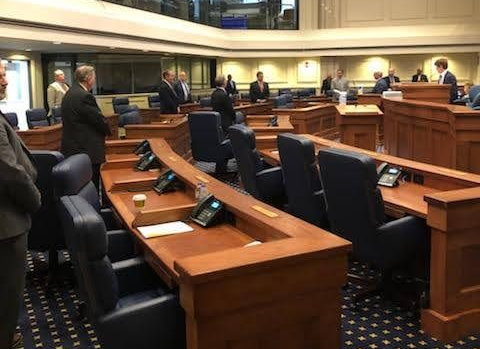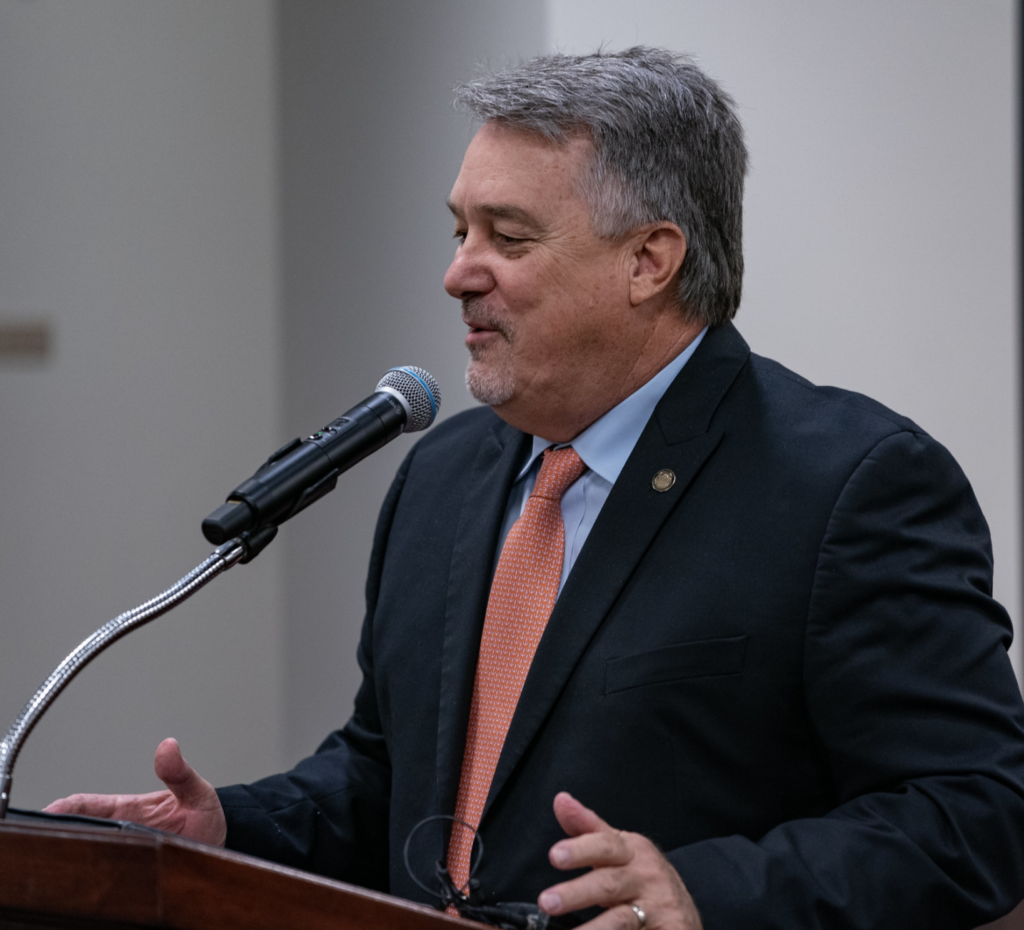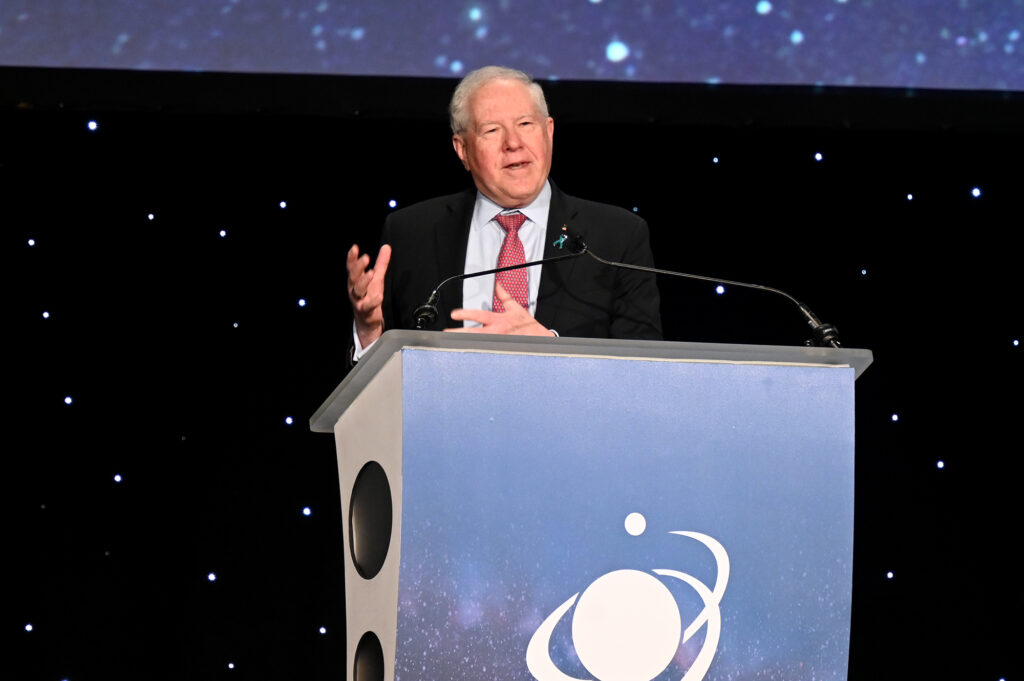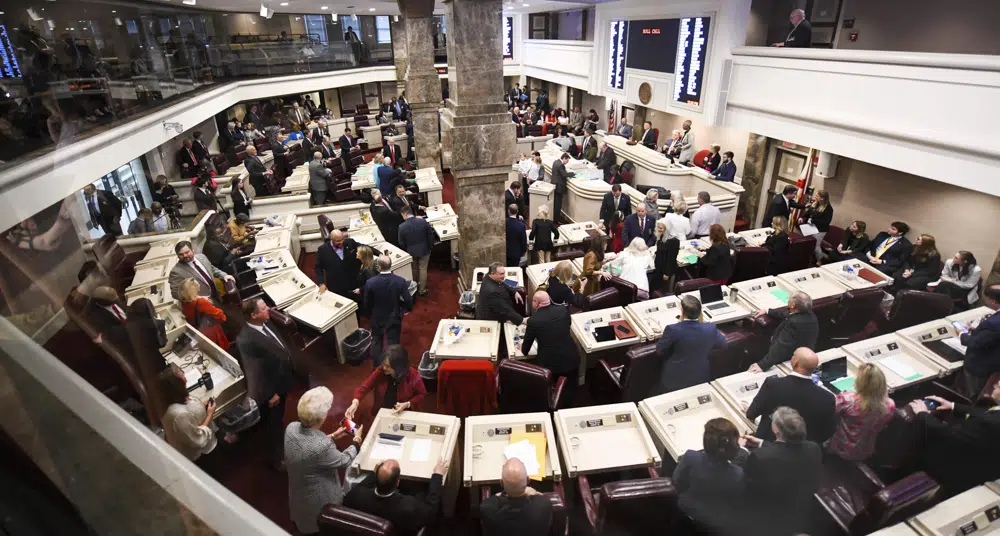Gov. Kay Ivey announces special election dates for Senate District 9

On Wednesday, Governor Kay Ivey signed a proclamation setting special election dates for Alabama Senate District 9. This seat was previously held for the last 13 years by Sen Clay Scofield (R-Guntersville), who resigned Monday to take a position as the Vice President of the powerful Business Council of Alabama (BCA). Governor Ivey set the special primary election for Tuesday, January 9, 2024, and the special primary runoff, if necessary, for Tuesday, February 6, 2024. The special general election is set for Tuesday, April 23, 2024. “Majority Leader Scofield has been a strong voice for the people of Senate District 9 for more than 13 years, and I have no doubt that he will continue to serve our state well in his next chapter,” said Gov. Ivey. “Clay and I have worked together both while I served as lieutenant governor and now as governor. Certainly, I can attest for all he has done for the people in North Alabama and Alabamians all across our state. I encourage everyone in this district to get out and vote during this special election and send another strong voice to Montgomery.” Gov. Ivey set a very short qualifying period of just seven days for this special election. The deadline for qualifying with major political parties will be Tuesday, November 7, 2023, at 5:00 p.m. The deadline for all independent candidates and minor parties to submit their paperwork, including ballot access petitions, is Tuesday, January 9, 2024, at 5:00 p.m. Senate District 9 represents portions of Blount, Madison, and Marshall Counties. State Representative Brock Colvin (R-Guntersville) has already announced his intention to run for this position, as has State Representative Wes Kitchens (R-Boaz). At least three other candidates are reportedly strongly considering running for this open state Senate seat. On Monday, the GOP state senators elected Steve Livingston (R-Scottsboro) to replace Scofield as Senate Majority Leader. The Alabama Senate pays $53,913 a year and is a part-time position. To connect with the author of this story or to comment, email brandonmreporter@gmail.com.
Clay Scofield reported to be leaving Alabama Senate

Senate Majority Leader Clay Scofield (R-Guntersville) is expected to resign his position in the Alabama Senate this week – perhaps as early as Monday – sources say. Scofield is expected to leave the State Senate to accept a role with the Business Council of Alabama (BCA). Sources claim that the Alabama Ethics Commission has reportedly approved Scofield’s acceptance of the powerful position most typically associated with the BCA’s lobbying efforts, with the understanding that he will not personally lobby the State Senate until the two-year revolving door period has passed. Scofield, 43, is a poultry farmer with a degree in agricultural economics from Auburn University. The BCA, which represents both small and large businesses, is one of the most influential lobbying forces in Montgomery. Their most recent success, however, comes not from a lobbying win but from the election of their past president, Katie Britt, to the U.S. Senate. After years of supporting failed candidates for the U.S. Senate, Britt’s campaign found its footing running not as the BCA choice but by distancing her from the powerful organization she ran beginning in 2018 and emphasizing her ability to show independence from their moderate agenda. Britt bucked the BCA publically against the COVID Vaccination Mandates. BCA, while often at odds with the pulse and tone of voters, has remained one of the strongest campaign and lobbying powerhouses of the state. Other entities wielding comparable influence include the Alabama Farmers Federation (ALFA), the Alabama Education Association (AEA), and the Alabama Forestry Association. Should Scofield deflect from the legislature to the BCA, leaving an open position in the State Senate, a special election would have to be called by Alabama Governor Kay Ivey. Sources report to Alabama Today that both Rep. Brock Colvin (R-Guntersville) and Rep. Wes Kitchens (R-Boaz) are expected to seek the position. The part-time position in the Alabama Senate pays $53,913 per year. The regular legislative session is a maximum of thirty legislative days. Republicans presently control 28 of the 35 seats in the Alabama Senate. The 27 remaining Republican state Senators will have to select a new Majority Leader. The Majority Leader is second in power in the Senate to only the President Pro Tem. – currently Sen. Greg Reed (R-Jasper). Scofield was elected in the Republican wave election of 2010 – which saw the GOP gain control of both Houses of the Alabama Legislature for the first time in 135 years. Scofield was unopposed in 2018 and 2022. Scofield has denied reports by 1819 News that he intends to leave the Senate to become a lobbyist. However, it is still possible that this is true. To connect with the author of this story or to comment, email brandonmreporter@gmail.com.
Speaker Nathaniel Ledbetter appoints House Members to serve on a study commission evaluating Alabama’s labor force participation

Alabama has the lowest unemployment rate in state history. There are job openings all over the state that businesses and governments cannot fill, yet the state has one of the country’s worst labor force participation rates. That Alabamians are choosing to stay home rather than join the booming economy has increasingly perplexed state leaders. “Despite having one of the lowest unemployment rates in the country and a record number of Alabamians working, the percentage of Alabamians participating in the labor force is lower than almost any other state,” Governor Kay Ivey wrote recently. “While we are increasing that by the tens of thousands, we have to change this statistic. Getting folks off the sidelines and into the labor force is my next priority.” On Monday, Speaker of the House Nathaniel Ledbetter announced members of the Alabama House of Representatives that will serve on an ad hoc committee studying Alabama’s labor force participation rates and identifying barriers to workforce entry. “Alabama is witnessing record-breaking economic growth and historically low unemployment rates,” Ledbetter said. “Despite these numbers, in Alabama, there are roughly 140,000 job openings and, at the same time, 48,834 unemployed workers across our state. That means we are lacking nearly 100,000 workers over 16 years old, which puts our labor force participation rate at a mere 57 percent—one of the lowest rates in the entire country.” The House members appointed to serve on the study commission will be Rep. Reed Ingram (R–Pike Road), who will serve as the Chairman of the Committee. Rep. Danny Garrett (R–Trussville); Rep. Donna Givens (R–Robersdale); House Minority Leader Anthony Daniels (D–Huntsville); Rep. James Lomax (R–Huntsville); Rep. Barbara Drummond (D–Mobile); Rep. Mike Kirkland (R–Scottsboro); Rep. Bill Lamb (R–Tuscaloosa); Rep. Kelvin Lawrence (D–Hayneville); Rep. Curtis Travis (D–Tuscaloosa); Rep. Chris Pringle (R–Mobile); Rep. Matt Woods (R–Jasper); Rep. Wes Kitchens (R–Guntersville); Rep. Jim Carns (R–Birmingham); and House Majority Leader Scott Stadthagen (R–Hartselle). “Over the coming months, it will be imperative for this group to build on the progress of, and collaborate with, existing entities such as the Lt. Governor’s Commission on 21st Century Workforce, the Alabama Community College System, Alabama higher-education institutions, and essential stakeholders across the private sector,” Ledbetter said. The study commission is expected to address areas including extending adequate childcare to families, examining the correlation between productivity growth and labor output, ensuring wages and salaries are competitive, addressing workforce housing concerns, and offering improved and more expansive mental health programs and services to citizens. “An insufficiency of resources such as these creates barriers to workforce entry as much as an absence of quality education,” Ledbetter postulated. The study commission is slated to host their first meeting on Thursday, October 5, at 10:00 a.m. in room 617 of the Alabama State House. To connect with the author of this story or to comment, email brandonmreporter@gmail.com.
Nathaniel Ledbetter announces House members who will serve on labor force participation study

With unemployment still sitting at a record low of 2.1%, the state is looking for ways to increase the number of Alabamians in the workforce. Speaker of the House Nathaniel Ledbetter announced on Monday key House members that will serve on an ad hoc committee studying Alabama’s labor force participation rates and identifying barriers to workforce entry. In July, Gov. Kay Ivey said labor force participation was a top priority. “Despite having one of the lowest unemployment rates in the country and a record number of Alabamians working, the percentage of Alabamians participating in the labor force is lower than almost any other state,” Gov. Ivey wrote in an op-ed. “While we are increasing that by the tens of thousands, we have to change this statistic. Getting folks off the sidelines and into the labor force is my next priority.” In September, Alabama Department of Labor Secretary Fitzgerald Washington announced that Alabama’s Labor Force Participation Rate (LFPR) rose only slightly in August to 57.0%. This is up from last August’s rate of 56.9%. “Alabama is witnessing record-breaking economic growth and historically low unemployment rates,” Ledbetter said in a press release. “Despite these numbers, in Alabama, there are roughly 140,000 job openings and, at the same time, 48,834 unemployed workers across our state. That means we are lacking nearly 100,000 workers over 16 years old, which puts our labor force participation rate at a mere 57 percent—one of the lowest rates in the entire country.” “Yet again, we are announcing record-breaking economic statistics this month,” said Secretary Washington. “While our labor force participation rate remained unchanged, we are continuing to work with marginalized groups to get them into our labor force.” The House Members serving on the study commission will be Rep. Reed Ingram (R–Pike Road) – Chairman; Rep. Danny Garrett (R–Trussville); Rep. Donna Givens (R–Robersdale); Rep. Anthony Daniels (D–Huntsville); Rep. James Lomax (R–Huntsville); Rep. Barbara Drummond (D–Mobile); Rep. Mike Kirkland (R–Scottsboro); Rep. Bill Lamb (R–Tuscaloosa); Rep. Kelvin Lawrence (D–Hayneville); Rep. Curtis Travis (D–Tuscaloosa); Rep. Chris Pringle (R–Mobile); Rep. Matt Woods (R–Jasper); Rep. Wes Kitchens (R–Guntersville); Rep. Jim Carns (R–Birmingham); Rep. Scott Stadthagen (R–Hartselle). “Over the coming months, it will be imperative for this group to build on the progress of, and collaborate with, existing entities such as the Lt. Governor’s Commission on 21st Century Workforce, the Alabama Community College System, Alabama higher-education institutions, and essential stakeholders across the private sector,” stated Ledbetter. Some specific areas the study commission will address are extending adequate childcare to families, examining the correlation between productivity growth and labor output, ensuring wages and salaries are competitive, addressing workforce housing concerns, and offering improved and more expansive mental health programs and services. “An insufficiency of resources such as these creates barriers to workforce entry as much as an absence of quality education,” Ledbetter concluded.
AG Steve Marshall applauds bill that corrects fatal flaw in parole statute

On Thursday, Alabama Governor Kay Ivey signed legislation to prevent criminals facing serious pending charges from getting out on parole. House Bill 131 (HB131) was sponsored by State Representative Wes Kitchens (R-Guntersville) and carried in the Senate by State Sen. Sam Givhan (R-Huntsville). Alabama Attorney General Steve Marshall applauded the signing of HB131 to correct a fatal flaw in Alabama’s parole system. HB131 was proposed after the infamous Jimmy O’Neal Spencer case exposed a statutory loophole that allowed a prisoner with pending charges to still be considered for parole before those charges were properly resolved. “Throughout the session, this legislature has prioritized the correction of deficiencies within our criminal justice system,” said Attorney General Marshall. “HB131 closes an important loophole to ensure that no offender be released on parole while new charges are pending. This is a public safety issue, but it also spares crime victims of having to show up and relive their experiences at parole hearings that are unnecessary.” In August 2022, Jimmy O’Neal Spencer – who was serving two life sentences and was awaiting trial on three capital-murder charges – was given a parole hearing. The parole board at the time denied Spencer’s parole, but Marshall said that this peculiar loophole in our parole system needed to be closed. According to the synopsis, “Under existing law, prisoners in the custody of the Department of Corrections are eligible for parole in certain circumstances. This bill would provide that a prisoner is not eligible for parole if he or she has been duly charged with a new offense that has not been disposed.” “If you are a prisoner facing serious charges that carry penalties by more than six months, you can’t be up for parole,” Kitchens said. Spencer, a lifetime career criminal, came up for parole even though he was then facing three charges of capital murder for the slayings of Colton Lee, Martha Reliford, and Marie Martin. Crimes he committed after the previous Parole Board granted him parole even though he was serving two life sentences. An angry Gov. Ivey replaced the Board members in the wake of this and other debacles for their leniency that was widely condemned as far too reckless. The new Parole Board denied Spencer’s parole application, but that could have ended differently with much more lenient parole commissioners. The signing of this legislation has closed that loophole in existing statute. 2023 has been a good legislative session for Marshall. He said that as the Chief Law Enforcement Officer of Alabama, he has led on three public safety initiatives this legislative session, including the Deputy Brad Johnson Act and SB143, creating sentencing enhancements for members of criminal enterprises, including gangs. Each bill has been met with overwhelming bipartisan support. The legislature has also imposed stiffer penalties on exhibition driving, organized retail theft, and deadly fentanyl traffickers. The state is in the process of building two new mega prisons in Elmore and Escambia Counties. Marshall is serving his second elected term as attorney general following his landslide re-election last year. Tuesday is the final day of the 2023 Alabama Regular Legislative Session. To connect with the author of this story or to comment, email brandonmreporter@gmail.com.
Alabama legislators urge Air Force Secretary Frank Kendall to support congressional investigation into Space Command decision

On Tuesday, a bipartisan group of legislators in the Alabama House of Representatives sent a letter to U.S. Airforce Secretary Frank Kendall supporting the congressional investigation led by U.S. House Armed Services Committee Chairman Mike Rogers and Congressman Dale Strong. The letter was signed by Speaker of the House Nathaniel Ledbetter, House Minority Leader Anthony Daniels, House Majority Leader Scott Stadthagan, and Speaker Pro Tem. Chris Pringle, as well as Reps. Joe Lovvorn, Danny Garrett, Wes Kitchens, Laura Hall, Parker Moore, David Cole, Rex Reynolds, Andy Whitt, James Lomax, Ritchie Whorton, and Phillip Rigsby. An NBC news report released on May 15 claimed that President Joe Biden will intervene to keep the Pentagon from moving Space Command from Colorado to Huntsville. The President’s objections to the state of Alabama are reportedly due to the state’s ban on abortion. Many speculate that the real reason could be political in that Colorado voted for Biden in 2020, while Alabama did not. Below is the text included in the attached letter: “Dear Secretary Kendall, “As members of the Huntsville and Madison delegations of the Alabama House of Representatives, and as House leadership, we are writing to you in support of the House Committee on Armed Services’ investigation into the delay in implementing the recommendation to place U.S. Space Command (SPACECOM) Headquarters at Redstone Arsenal, which is being led by U.S. House Armed Services Committee Chairman Mike Rogers and Congressman Dale Strong.” “As you are aware, it has been made clear through multiple U.S. Air Force recommendations that the most strategic location for the U.S. Space Command headquarters is Redstone Arsenal in Huntsville, Alabama. The Government Accountability Office and Department of Defense Inspector General have both confirmed this recommendation was made through a sound process. Huntsville has the infrastructure, the workforce, the education system, engineering base, existing military and defense apparatus, and quality of life to be the ideal location for U.S. Space Command. This is why this site has received the unanimous number one recommendation from the U.S. Air Force.” “As representatives of the communities surrounding Redstone Arsenal in the Alabama House of Representatives, we felt the need to respectfully encourage you to support and comply with the congressional investigation into the delay of this critical national security decision. We are also concerned to learn the U.S. Department of Defense was not aware, and not involved, in this change. The people of Alabama and the United States of America need and deserve transparency on the apparently revised mission requirements of SPACECOM as it relates to its decision to locate its headquarters.” “A lengthy delay in making a decision this important to national security deserves Congressional oversight, and we are thankful that Congressmen Rogers and Strong recognized this need and are taking action by launching this investigation. We greatly appreciate your service to our nation and the role that the U.S. Air Force has in keeping our country, and the world, safe from threats, and we believe that you also appreciate the need for transparency and Congressional oversight.” On Friday, Fox News published a story detailing an announcement from Rogers that he is opening an investigation into the continued delays in the selection of a permanent base for the U.S. Space Command (SPACECOM) Headquarters. “Today, I launched an investigation into the continued delays in the SPACECOM Headquarters basing decision,” said Chairman Rogers. “The fact is, the Air Force already made the correct decision well over two years ago. That decision was affirmed by the GAO and the DoD Inspector General over a year ago. This decision was based on multiple factors, and Redstone Arsenal in Huntsville, Alabama, was the clear winner in the Evaluation and Selection phase. I am deeply concerned that the continued delays in making this move final are politically motivated and damaging to our national security.” “I have requested that House Armed Services Committee Chairman, Mike Rogers, open a formal investigation into the Biden Administration’s failure to announce a permanent location for U.S. Space Command (SPACECOM) Headquarters,” said Rep. Strong.“The Administration’s delay risks politicizing a process which must remain fact-based. Injecting politics into America’s basing decisions serves to do unprecedented harm to our national security. American men and women in uniform must be given the very best, not the third or fourth choice. Redstone Arsenal was chosen as the preferred location after a years-long process. The decision was later confirmed not just once, but twice with the results of the Government Accountability Office and Department of Defense Inspector General investigations. It is plain and simple: Redstone Arsenal is the best possible location to host U.S. Space Command headquarters. The Air Force’s basing process established this, and it was confirmed. I thank Chairman Rogers for agreeing to this investigation. The members of the House Armed Services Committee, and our service members awaiting a final basing decision, deserve answers and swift action from the Air Force.” The letter by the State Representatives followed the announcement of the investigation by Rogers. To connect with the author of this story or to comment, email brandonmreporter@gmail.com.
Steve Flowers: Alabama has a host of outstanding political leaders under 45

It may appear to you and most casual observers of Alabama politics that our Alabama elected officials are old. That observation is accurate when you observe our current leaders in the highest offices. The governor’s office has been held by mature folks in recent years. Our current Governor, Kay Ivey, is 78 and has been the object of national media humor for appearing to be a pistol-toting great-grandmother. Dr. Robert Bentley, her predecessor, was in his 70’s, but he may have been sprier than he appeared. Bob Riley was no spring chicken while governor at age 65, although he looked younger. Our iconic senator, Richard Shelby, retired in January at 88 after a record-breaking 36 years in the U.S. Senate. Our new Senior Senator, Tommy Tuberville, is 68. This was not always the case in the Heart of Dixie. In the period from 1930 through 1970, we elected the youngest political leaders in the nation, beginning with our legendary tandem of United States Senators Lister Hill and John Sparkman, who served together close to 30 years. Lister Hill was elected to Congress from Montgomery in 1923 at age 29 and was elected to the U.S. Senate at age 44. John Sparkman was elected to the U.S. Senate in 1946 at 46 after serving as the Congressman for the Tennessee Valley. If you think Hill and Sparkman were young when they went to Washington, you have not seen anything like the governors we elected from 1946 -1966. James E. “Big Jim” Folsom was 38 when he was elected in 1946. John Patterson was 37 when he was elected in 1958. Patterson was referred to as the “Boy Governor.” When George Wallace was elected to his first term in 1962, he was only 43. When his wife Lurleen Wallace was elected in 1966, she was 40. She died in office of cancer less than two years later at 41. Lurleen Wallace was succeeded by Lt. Governor Albert Brewer, who had been Speaker of the Alabama House at 34, Lt. Governor at 38, and was 39 when he became governor. Bill Baxley was the youngest Attorney General in America when he was elected Attorney General of Alabama at 29 years old in 1970. He had been a 25-year-old District Attorney in Houston and Henry Counties. Baxley still practices law in Birmingham at 81. Well, folks, a cursory look at our current top elected officials may appear old. However, we have a generation of young political leaders arriving on the scene in Alabama. We already have superstars on the horizon and already on the scene who are under 45. Our new United States Senator, Katie Britt, is only 40 years old. She has the ability and youthfulness to be one of Alabama’s greatest senators. She has gotten to the Senate at a younger age than Hill, Sparkman, or Shelby. Marshall County has become the hotbed and breeding ground for the next generations of Alabama political leaders. This beautiful pristine lake area of North Alabama lays claim to Lt. Governor Will Ainsworth, age 41, State Senate Majority leader Clay Scofield, age 42, and State Representative Wes Kitchens, who is 35 and is Vice Chairman of the House Republican Caucus. Andrew Sorrell, the newly elected State Auditor, is only 37. He has a bright future. The brightest star in the Democratic ranks is Huntsville State Representative Anthony Daniels. At age 40, Daniels is a superstar. He is in his third term in the House from Huntsville. He is the Minority Leader in the House. This gentleman is also a successful high-tech businessman in Rocket City. There are several other stars under 45 in the Alabama House of Representatives besides Daniels and Kitchens, including Kyle South of Fayette, Matt Simpson of Daphne, Joe Lovvorn of Auburn, Ben Robbins of Sylacauga, Scott Stadthagen of Madison, Corey Harbison of Cullman, and very young newcomers James Lomax of Huntsville and Brock Colvin of Albertville. Joining the affable and accomplished 42-year-old Senate Majority Leader, Clay Scofield in the powerful State Senate in the under 45 superstar group are Senator Chris Elliott, 42, of Baldwin, Senator Andrew Jones, 38, of Cherokee, and newly elected Senator Josh Carnley from Coffee County who is 44. Alabama has a host of under 45 political leaders. See you next week. Steve Flowers is Alabama’s leading political columnist. His weekly column is seen in over 60 Alabama newspapers. Steve served 16 years in the legislature. He may be reached at: www.steveflowers.us.
House committee gives favorable report to bill to deny parole to felons

On Wednesday, the Alabama House Judiciary Committee voted to advance legislation that would deny parole to convicts who are facing additional charges with new serious offenses. House Bill 131 (HB131) is sponsored by State Rep. Wes Kitchens. “This deals with a loophole that came up in the Jimmy Spencer case,” Kitchens said. “This helps close that loophole up.” According to the synopsis, “Under existing law, prisoners in the custody of the Department of Corrections are eligible for parole in certain circumstances. This bill would provide that a prisoner is not eligible for parole if he or she has been duly charged with a new offense that has not been disposed.” “If you are a prisoner facing serious charges that carry penalties by more than six months and you can’t be up for parole,” Kitchens said. The Alabama House Judiciary Committee voted to give HB131 a favorable report in a unanimous vote. The issue that sparked this concern was that Career criminal Jimmy Spencer came up for parole even though he was then facing three charges of capital murder for the slayings of Colton Lee, Martha Reliford, and Marie Martin. Crimes he committed after the previous Parole Board granted him parole even though he was serving two life sentences. Alabama Governor Kay Ivey replaced the Board members in the wake of this and other debacles with leniency that was widely condemned as reckless. The new Parole Board denied Spencer’s parole application, but that could have ended differently with more lenient parole commissioners. The sponsor claims this legislation is designed to close that loophole in existing statutes. The Alabama Bureau of Pardons and Paroles oversees the state’s parolees. The Parole Board hears inmates’ requests for both pardons and paroles. HB131 could be considered by the full Alabama House of Representatives as early as Thursday. Thursday will be day seven of the 2023 Alabama Regular Legislative Session. To connect with the author of this story or to comment, email brandonmreporter@gmail.com.
Steve Flowers: Marshall County and Enterprise emerging as Alabama political breeding grounds

Over the years, certain counties in Alabama have bred an inordinate number of governors and state political leaders. The three most prominent enclaves historically have been Tuscaloosa, Barbour, and Cullman. In the earlier years of statehood, Tuscaloosa was the most heralded county. They have continued, intermittently, throughout the years. The most prominent senator in Alabama history, Richard Shelby, who retired after 36 years in the Senate, calls Tuscaloosa home. Indeed, the state capital was in Tuscaloosa one time in the early years. They have had a fairly recent governor in Dr. Robert Bentley. Barbour County is called the “Home of Governors,” and for a good reason. They have had more governors than any county in state history. This sparsely populated Black Belt county has had six governors hail from there. George Wallace is, of course, the most prominent Barbour County Governor, but they also have Chauncy Sparks, John Gill Shorter, William Jelks, Braxton Bragg Comer, and Jere Beasley. Barbour County and Tuscaloosa both claim Lurleen Wallace. She was born and raised in Northport in Tuscaloosa County but married George Wallace and moved to Barbour County. This split county claim of governors also applies to legendary Governor James “Big Jim” Folsom. Big Jim was born and raised in Coffee County near Elba but moved to Cullman as a young man. So, Cullman gets bragging rights since he lived in Cullman when he was first elected in 1946. Cullman has indeed come on strong in the past few decades. They have had two governors in recent years, Jim Folsom Jr. and Guy Hunt. Today, we have two counties emerging as hotbeds for breeding state political leaders. Coffee County is percolating with political success. More particularly the growing City of Enterprise. Our new U.S. Senator, Katie Boyd Britt, was born and raised in Enterprise. She is only 40. The Congressman from the second district, Barry Moore, is from Enterprise although Dothan, Montgomery, and Elmore County have more population in that Congressional District. Moore is only 56. A rising popular star in the State House of Representatives, Rhett Marquis, 48, is from the Boll Weevil City. Enterprise is the home of the new state senator from that southeast Alabama hub. Josh Carnley just took the seat of retiring legend Jimmy Holley, thus keeping that seat in Coffee County. Carnley is a Coffee County farmer and insurance broker. Enterprise has a very good Mayor in William “Bill” Cooper. He has been in city politics for a good while. Coffee County also dominates all the judicial posts in this circuit. All three circuit judges hail from Coffee County in Enterprise. Sonny Reagan, Jeff Kelley, and Shannon Clark are all relatively young. The new District Attorney, James Tarbox, is very young. Jimmy Baker, who is Chancellor of the Alabama Community College System, hails from Coffee County and lives in Enterprise. Enterprise has always laid claim to Ft. Rucker, which has been the impetus of their growth, but they are emerging as a political powerhouse. The other county that is set to be called an Alabama political spawning ground powerhouse is Marshall County. They currently have a cadre of the state’s most powerful and promising Alabama leaders. The most prominent is 41-year-old Lt. Governor Will Ainsworth, who may be our next governor. State Senator Clay Scofield of Marshall County is only 42 and is Majority Leader of the State Senate. Attorney General Steve Marshall, 57, is in his second term as Attorney General. It is rare that two of the state’s highest-ranking officials, Will Ainsworth and Steve Marshall, are both from the same county. There are two rising stars in the Alabama House of Representatives from Marshall County. Young Wes Kitchens, an emerging leader in the House, is from Marshall. Also, the youngest member of the House of Representatives, Brock Colvin, has just been elected at the ripe old age of 26 and is catching people’s eyes on Goat Hill. Enterprise and Marshall County are emerging as new political breeding grounds for Alabama politicians. See you next week. Steve Flowers is Alabama’s leading political columnist. His weekly column appears in over 60 Alabama newspapers. He served 16 years in the state legislature. Steve may be reached at www.steveflowers.us.
Steve Flowers: Legislature organizes for Quadrennium

The legislature had their every four-year organizational session earlier this month. It is exactly what the title states. They are organizing for the next quadrennium of lawmaking. They officially chose their leadership and adopted the rules for the two chambers. The 105-member House of Representatives and 35-member State Senate are elected for four-year terms, the same as the governor and other constitutional offices. However, unlike the governor, who was sworn in on Monday, January 16, as set out in the state constitution, the legislature takes office the day after they are elected in November. The state House of Representatives will have 77 Republicans and 28 Democrats. That is a veto-proof, bulldozer-shoving, anything-you-want supermajority. The Democrats have very little say with those overwhelming numbers. Two days after they were elected in November, the 77-member Republican majority met in a private caucus meeting in Montgomery and selected their leadership. Therefore, the vote for Speaker of the House two weeks ago was simply a formality. The House has chosen Representative Nathaniel Ledbetter to be the Speaker of the House. Speaker Ledbetter hails from Rainsville in DeKalb County. He is a former Mayor of Rainsville. He has only been in the House of Representatives for eight years, having been first elected in 2014. He was chosen to be the majority leader in the House in his freshman year. He was close to the former Speaker Mac McCutcheon, and he served on both the powerful agenda-setting Rules Committee, as well as the Ways and Means Education Budget Writing Committee. Representative Chris Pringle of Mobile has been chosen to be Speaker Pro Tem of the House, which is the second highest position within the body. He has served previously for 16 years in the House from the Port City. He succeeds fellow Mobilian Victor Gaston in this post. There are two young stalwarts who will be serving in Republican Party positions within the House. Representative Scott Stadthagen of Decatur will be the new House Majority Leader. Representative Wes Kitchens of Arab will serve as the Republican Leadership Caucus Vice Chair. Representative Debbie Wood from the Valley will serve as the Republican Caucus Secretary/Treasurer. The three most powerful posts in the House are the chairmanships of the two money committees and the agenda-setting Rules Committee. Representative Danny Garrett of Trussville in Jefferson County will continue to Chair the Ways and Means Education Budget Committee. Representative Rex Reynolds of Huntsville will be the General Fund Ways and Means Chairman. Reynolds replaces longtime Ways and Means Chairman Steve Clouse of Ozark. Representative Joe Lovvorn of Auburn will be the new Rules Committee Chairman. Representative Jim Hill of St. Clair will chair Judiciary. He is a former circuit Judge and a veteran of the House. All of these House leadership positions are held by Republicans. To the victor goes the spoils. The Democrats have a veteran and sterling team heading their Caucus Leadership in the House. Anthony Daniels of Huntsville will be the Democratic Minority Leader. Barbara Drummond of Mobile will be the Caucus Chair. Mary Moore of Birmingham will be the Vice Chair, and Kelvin Lawrence of Hayneville will be Secretary/Treasurer of the Democratic Caucus. The 35-member Alabama State Senate returns almost intact with their continuity and quality leadership. They will dominate and provide a stable State of Ship to help lead the state. Republicans control this upper chamber to the same degree that the GOP members do in the House. Republicans outnumber Democrats 28 to 7 in the Senate. State Senator Jabo Waggoner of Jefferson County begins his 50th year in the legislature. This is a state record. He is definitely destined for the state history books. Jabo will continue to Chair the powerful Rules Committee. Greg Reed of Walker County will be Pro Tem of the Senate again. The Majority Leader will again be Clay Scofield of Marshall County. The two money committee chairmen will continue to be in charge of how the state revenues are spent. Senator Arthur Orr of Decatur will chair Finance and Taxation/Education. Senator Greg Albritton of Escambia will chair Finance and Taxation/General Fund. These two men will be very powerful. Popular state Senator Will Barfoot of Pike Road will chair Judiciary in the Senate. Senator Clyde Chambliss of Prattville has become a stalwart leader in the Senate. He will be Majority Whip. Lieutenant Governor Will Ainsworth presides over the Senate. The Regular Session begins in early March. See you next week. Steve Flowers is Alabama’s leading political columnist. His weekly column appears in over 60 Alabama newspapers. He served 16 years in the state legislature. Steve may be reached at www.steveflowers.us.
Alabama voters approve $85 million bond issue to fund public historical sites and state parks

Alabama voters approved Amendment 1, a constitutional amendment, on May 24. Amendment 1 authorized the state to issue up to $85 million in bonds for state parks. With 100% of precincts reporting, the vote was 77%-23%. Amendment 1 authorized $80 million of the bond amount for state parks managed by the Department of Conservation and Natural Resources (ADCNR) and $5 million for historic sites managed by the Alabama Historical Commission. Under Amendment 1, bond proceeds could not be used for improvement or maintenance of the Confederate Memorial Park in Marbury, Alabama. If bond proceeds exceed $85 million for any reason, Amendment 1 requires them to be allocated to the Alabama Forestry Commission for capital improvements and maintenance of state forests. State Rep. Nathaniel Ledbetter (R-24) and Rep. Wes Kitchens (R-27) sponsored Amendment 1 in the Legislature as House Bill 565. The House voted 97-1 on April 13, 2021. The Senate voted 29-0 on an amended version on April 29. The House voted 98-0 on the final version. Rep. Ledbetter said, “Because interest rates are so low today, we’re able to use the same amount that we’re paying out now, redo new bonds and put $80 million into the existing parks, which is going to be a tremendous asset to our state and to our tourism and across our state.” On November 8, Alabama will decide nine other constitutional amendment, including a recompiled state constitution. The other amendments would: authorize the Code Commissioner to incorporate constitutional amendments that are approved at the elections on May 24 and November 8 into the Alabama Constitution of 2022 if voters approve the new constitution allow local governments to award funding provided for broadband internet infrastructure to public or private entities; remove orphans’ business from the jurisdiction of county probate courts; allow the legislature to provide for offenses for which bail may be denied; require changes to laws governing the conduct of a general election to be implemented at least six months before the general election; require the governor to provide notice to the attorney general and the victim’s family before granting a commutation or reprieve of a death sentence specify that counties and municipalities have authority to finance economic and industrial development through the use of public funds, issuing bonds, and leasing property or lending bonds to a private entity; and authorize specific cities to use a previously established property tax to directly fund capital improvements in addition to using the revenue to repay bonds and other debt. Both houses of the Alabama State Legislature are required to pass a proposed constitutional amendment by a three-fifths (60%) supermajority vote in order to refer it to the statewide ballot. If the amendment is approved by a simple majority of voters, it becomes part of the state constitution. A total of 78 constitutional amendments appeared on the statewide ballot in Alabama during even-numbered election years from 2000 to 2020, of which 62 were approved (79.49%), and 16 were defeated (20.59%). From 2000 to 2020, the number of constitutional amendments on the statewide ballot during even-numbered years ranged from four to 15. Republished with the permission of The Center Square.
Here’s everyone who the BCA has endorsed in the 2018 election cycle

The Business Council of Alabama (BCA), considers itself Alabama’s foremost voice for business. It is a non-partisan, statewide, business association representing the interests and concerns of nearly 1 million working Alabamians. The BCA works with the Alabama Legislature to promote “pro-business” reforms such as: Tax credits for small business Job creation Incentives for economic development Ethics reform Positive changes in our public education system Here are the candidates who the BCA has endorsed, who they believe will bring the best changes and initiatives for Alabama’s businesses: Statewide Races: Governor: Kay Ivey Lieutenant Governor: Twinkle Cavanaugh Attorney General: Steve Marshall Secretary of State: John Merrill State Treasurer: John McMillan Commissioner of Agriculture and Industries: Rick Pate Judicial Races: Chief Justice: Lyn Stuart Associate Justice Place 1: Sarah Stewart and Brad Mendheim Associate Justice Place 2: Tommy Bryan Associate Justice Place 3: Will Sellers Associate Justice Place 4: Jay Mitchell Court Of Civil Appeals Place 1: Christy Edwards Court Of Civil Appeals Place 2: Judge Terri Thomas Court Of Civil Appeals Place 3: Judge Terry Moore Court Of Criminal Appeals Place 1: Richard Minor Court Of Criminal Appeals Place 2: Chris McCool Court Of Criminal Appeals Place 3: Judge Bill Cole State Senate Races Senate District 2: Tom Butler Senate District 3: Arthur Orr Senate District 5: Greg Reed Senate District 7: Mary Scott Hunter Senate District 12: Del Marsh Senate District 13: Randy Price Senate District 14: Cam Ward Senate District 16: Jabo Waggoner Senate District 17: Shay Shelnutt Senate District 18: Rodger Smitherman Senate District 32: Chirs Elliott State House Races House District 3: Humphrey Lee House District 6: Andy Whitt House District 8: Terri Collins House District 9: Scott Stadthagen House District 13: Connie Rowe House District 14: Richard “Bull” Corry House District 27: Wes Kitchens House District 30: Craig Lipscomb House District 36: Randy Wood House District 39: TJ Maloney House District 40: K.L. Brown House District 41: Corley Ellis House District 42: Jimmy Martin House District 43: Arnold Mooney House District 44: Danny Garrett House District 45: Dickie Drake House District 46: David Faulkner House District 47: David Wheeler House District 48: Jim Carns House District 49: April Weaver House District 50: Jim Hill House District 55: Rod Scott House District 73: Matt Fridy House District 87: Jeff Sorrells House District 88: Jeremy Arthur House District 89: Marcus Paramore House District 96: Matt Simpson House District 102: Willie Gray


